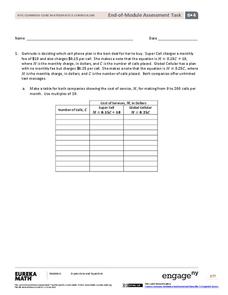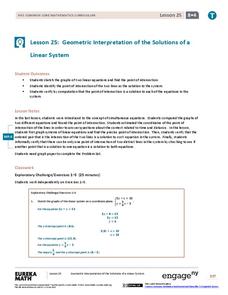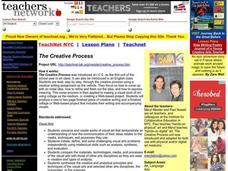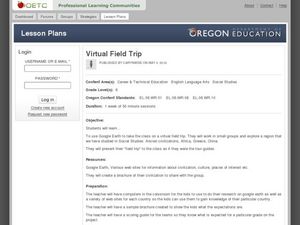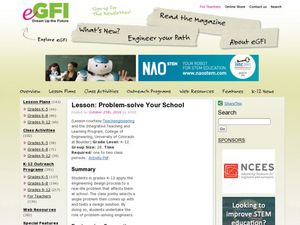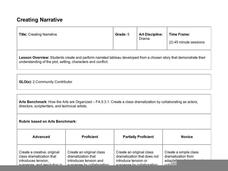EngageNY
Mid-Module Assessment Task: Grade 7 Mathematics Module 4
Assess the ability of the class to solve percent problems with an assessment that covers a variety of percent problems from basic to multi-step. Pupils make connections between percent problems and proportional thinking to complete...
EngageNY
Using Permutations and Combinations to Compute Probabilities
Now that we know about permutations and combinations, we can finally solve probability problems. The fourth installment of a 21-part module has future mathematicians analyzing word problems to determine whether permutations or...
Mathematics Assessment Project
Generalizing Patterns: The Difference of Two Squares
After completing an assessment task where they express numbers as the difference of squares (i.e., 9 = 5^2 – 4^2), class members note any patterns that they see in the problems.
EngageNY
End-of-Module Assessment Task: Grade 6 Math Module 4
Finish out the module with a bang. The last installment of a 36-part module is an end-of-module assessment task. Test takers set up equations to represent relationships and solve problems in an assortment of contexts.
Education Development Center
Distance, Rate, and Time—Walking Home
Dig into a classic math problem with your classes. Through an engaging task, learners work with rate and distance information to make conclusions. In the task, two people walk at different rates; one leaves first, and scholars...
Sargent Art
Symmetry: A Design Problem
As part of a study of design, young artists examine an example of a formal (symmetrical) design and then, following step-by-step directions, create their own.
EngageNY
Getting the Job Done—Speed, Work, and Measurement Units II
How fast is your class? Learners determine the amount of time it takes individuals to walk a given distance and calculate their speeds. Pupils solve distance, rate, and time problems using the formula and pay attention to the...
Mathematics Assessment Project
Sorting Equations and Identities
Identify the identity. Learners first solve equations to find the number of solutions. Scholars then determine if given equations are always, sometimes, or never true, leading to the concept of identities.
EngageNY
Geometric Interpretations of the Solutions of a Linear System
An intersection is more than just the point where lines intersect; explain this and the meaning of the intersection to your class. The 26th segment in a 33-part series uses graphing to solve systems of equations. Pupils graph linear...
Curated OER
The Creative Process
Students conceive and create works of visual art that demonstrate comprehension of how the communication of their ideas relates to the media, techniques, and processes they use. They initiate, define, and solve challenging visual arts...
Curated OER
Invention/Innovation/Creative Thinking/Opportunities/Ideas
Students, while examining inventions and innovators, identify, differentiate and discuss five Canadian inventors/innovations. After applying creative thinking strategies to a promotional piece, students brainstorm patents.
Curated OER
Creative and Cultural Dance
Students study dance as a way to communicate and represent oneself in the world. They perform and articulate movement skills from the "dancer's toolbox". They solve problems in dance using the "dancer's toolbox" composing, witnessing,...
Curated OER
If I Had the Power
Have your young learners practice using higher-order thinking skills by engaging in this problem-solving activity. They work in cooperative groups to solve problems, and list ways to address a variety of challenges. They explain their...
Curated OER
Virtual Field Trip
Are we there yet? Young trip planners learn about their state and plan a trip. They will select sites to see in three cities in their state, and record associated costs in a spreadsheet. While this was originally designed as a...
Curated OER
Using the Correct Vocabulary to Solve Problems
Third graders examine the vocabulary and strategies to be used with addition, subtraction, and multiplication word and story problems. They observe the teacher solve a variety of problems, then write and illustrate their own original...
Curated OER
Problem Solve Your School
Students work together to solve a real life problem that affects their school. They follow the engineering design process to develop and test their solution. They share their ideas with the class.
Curated OER
Finding Satisfactory Solutions
Students decide where to locate ice cream stands in a town so that no one has to travel too far to buy a treat. The problem-solving strategies for this problem give students a chance to decide what makes a solution satisfactory.
EngageNY
Creating Division Stories
Create your own adventure story ... well, not really. The fifth lesson in a 21-part series has pairs create story contexts for division problems. The lesson presents a step-by-step process for pupils to follow in writing such stories.
Mathematics Assessment Project
Deducting Relationships: Floodlight Shadows
Try to figure out what happens with shadows as a person moves between two light sources. A formative assessment instructional activity has individuals work on an assessment task based on similar triangles, then groups them...
Mathematics Vision Project
Module 5: Rational Functions and Expressions
Where do those asymptotes come from? Learners graph, simplify, and solve rational functions in the fifth module of a 10-part series. Beginning with graphing, pupils determine the key characteristics of the graphs including an in-depth...
Illustrative Mathematics
Dimes and Quarters
Here is a coin problem where the algebra learner determines the pair of linear equations needed to solve the system. Whether the equations are taken from a table, or your scholars recognize the format of a coin problem, it is an...
Benjamin Banneker Association
Celebrate Benjamin Banneker
Inventor, astronomer, surveyor, mathematician, clock maker. Learners celebrate the life of Benjamin Banneker by building creative analog clocks, making scale models, and solving problems related to surveying. The activities model the...
Hawaiʻi State Department of Education
Creating Narrative
Plot, setting, characters, and conflict are common to both drama and narrative stories. Kids create narrated tableaus that show their understanding of the plot, setting, and conflict of a story they've recently read. The lesson...
Education Development Center
Making Sense of Unusual Results
Collaboration is the key for this equation-solving lesson. Learners solve a multi-step linear equation that requires using the distributive property. Within collaborative groups, scholars discuss multiple methods and troubleshoot mistakes.





